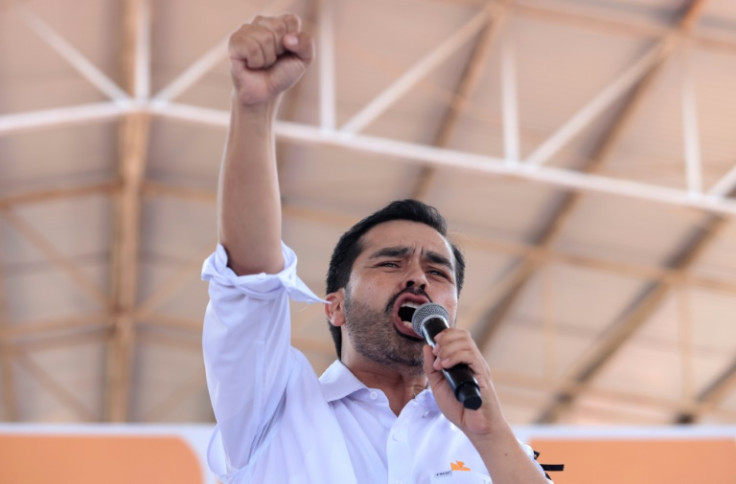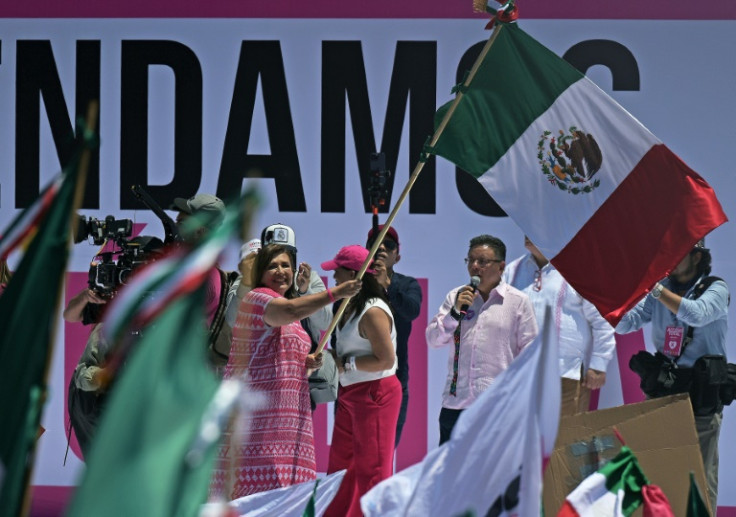'Huge Change': Mexico Expected To Elect First Woman President

Mexico is on course to elect its first woman president this weekend, with two front-runners competing to break the highest political glass ceiling in a country with a history of gender violence and inequality.
Ruling-party candidate Claudia Sheinbaum and opposition hopeful Xochitl Galvez, both 61, have dominated the presidential race in the world's most populous Spanish-speaking country, home to 129 million people.
The only man running, Jorge Alvarez Maynez, is trailing far behind with just days left before the Sunday vote.
"It's a huge change," said Guadalupe Correa-Cabrera, a professor at George Mason University, in the United States.
"A woman president will be an inspiration for women in every single sector of the economy, politics, society and culture," she told AFP.
Sheinbaum owes much of her popularity to President Andres Manuel Lopez Obrador, a close ally who has an approval rating of more than 60 percent but is only allowed to serve one term.
A former Mexico City mayor and a scientist by training, Sheinbaum has 55 percent of voter support, according to a poll average compiled by research firm Oraculus.
Galvez, an outspoken senator and businesswoman with Indigenous roots who represents a broad coalition of opposition parties, has 33 percent.
The longshot centrist resumed campaigning Saturday after suspending activities for several days following a stage collapse at one of his rallies that left nine people dead.
Mexico's next president will face an array of challenges, including managing migration, delicate relations with the neighboring United States and criminal violence that has left more than 450,000 people dead and tens of thousands missing since 2006.
Around 30 candidates for local office have been murdered in a wave of electoral violence since last September, in a country where politics, corruption and crime are closely intertwined.
"The ominous spread of organized crime and flourishing cartels is the most daunting problem Sheinbaum will need to confront" if elected, said Michael Shifter, a researcher and former president of the Inter-American Dialogue think tank in Washington.
Whoever wins, it will likely be business as usual for the cartels that control swaths of the country and smuggle vast amounts of cocaine, fentanyl and other drugs into the United States, experts predict.
"They're not going to change their attitude just because Mexico has a female president," Correa-Cabrera said.
Sheinbaum has pledged to continue Lopez Obrador's strategy of tackling crime at its roots -- a controversial strategy that the left-wing populist calls "hugs not bullets."
Galvez, who often evokes her childhood story of growing up in a poor, rural town in central Mexico, has vowed a tougher approach, declaring "hugs for criminals are over."
Another major challenge will be Mexico's complex relationship with the United States, particularly if former president Donald Trump is reelected in November, Shifter said.
"If he returns to the White House, Trump is expected to double down on his hardline stance on immigration, trade and drugs -- very sensitive issues crucial to the bilateral relationship," he said.
While Mexican women enjoy growing success in politics and business, gender violence remains a major problem in a country where around 10 women are murdered every day.
And while millions of Mexicans have escaped poverty in recent years, more than a third still live below the poverty line, official figures showed last year.
Mexico has Latin America's second-biggest economy, but many people rely on informal jobs to scrape together a living.
"One of the things that most affects us young people is work and obviously insecurity," said Fatima Gonzalez, a 20-year-old vendor in a town near Mexico City who admires Xochitl's "authenticity."
Having a woman president will not transform the lives of ordinary Mexican women overnight, Correa-Cabrera said.
"Inequality affecting women, particularly in the poorest segments of society, is not going to change just because we have a female president who represents the elite and privileged," she said.
As well as voting for a new president, Mexicans will choose members of Congress, several state governors and myriad local officials.
In total, more than 20,000 positions are being contested. Nearly 100 million people are registered to vote.
Ricardo Escobar, 20, hopes that a Sheinbaum presidency will bring benefits in terms of education and scholarships.
"We did well with the current government," he said.



© Copyright AFP {{Year}}. All rights reserved.





















